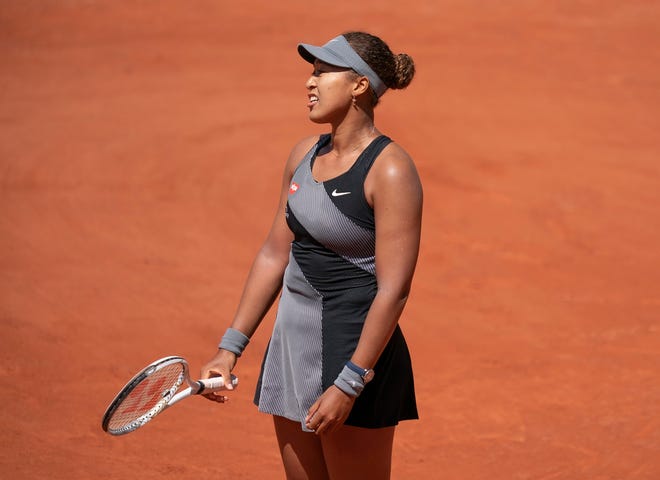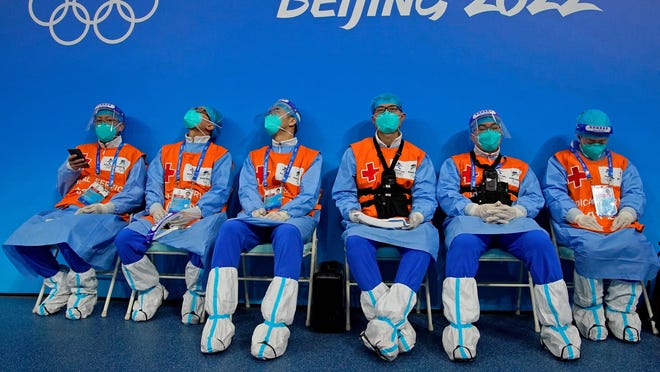Our Olympic athletes are having a mental health crisis. What are we doing about it besides watching?
 Jenna Ryu
Jenna RyuThe Olympics are supposed to be a fun, family-friendly spectacle. But two years into the pandemic and amid a nationwide mental health crisis, the 2022 Winter Olympics have, at times, been painful to watch.
Team USA already has seen greatness (look at the 22-year-old fan-favorite figure skater Nathan Chen. Or the redemption for Lindsey Jacobellis, who captured Team USA's first gold medal for snowboardcross). But it's difficult to celebrate these victories when they are juxtaposed with other athletes' struggles.
Zhu Yi, the 19-year-old U.S.-born figure skater competing for China, left the rink in tears after falling twice.
Mikaela Shiffrin cried on the side of the hill after skidding out of control and recording her second "Did Not Finish" – days after an emotional taped segment aired on NBC about how she is struggling with grief after her father's unexpected death. On Tuesday, her teary reaction aired in prime time for nearly five minutes. Viewers expressed pity and confusion over why Shiffrin's pain was plastered on their TVs for so long.
Original story:Mikaela Shiffrin's second DNF at Beijing Olympics even more shocking than her first
They've also expressed shock as various elite, often young athletes publicly struggle at the Games. But why is it still a surprise?
Over the past few years, superstars like Simone Biles, Naomi Osaka and Michael Phelps have been vocal about the need for change. They've told the us the pressure is too much, the expectations too high. And experts say the Olympics in the age of COVID-19 – with strict rules regarding who can attend, and on testing and quarantining – are even more of a challenge, exacerbating the stress and anxiety of the athletes.
"There's already so much pressure for the Olympics because all eyes are on you … but it wasn't just the normal Olympics this year. There was a lot of uncertainty about whether and how they would happen," says Sian Beilock, president of Barnard College at Columbia University and a cognitive scientist who specializes in sports psychology. "We know succeeding in the public eye is great, but failing can be extremely difficult."

Crashes, falls and injuries:Photos show heartbreak and recovery at the Winter Olympics
'It's a real pressure cooker'
Keith Kaufman, a clinical sports psychologist, says Olympic athletes already face so many pressures. The pressure to be perfect. The pressure to represent their country. Even when they are the best, they're expected to be better.
"A lot of these folks have trained for several years, if not a lifetime, to prepare for a short performance," Kaufman says. "It's a real pressure cooker. There's something very unique about the challenge of how sporadic the Olympics are, and how long and intense the preparation is."
But the strict COVID-19 restrictions in Beijing have added a layer of emotional distress this year: Fans are once again absent, and athletes' friends and family members are forced to stay home.

Research has shown that social support is crucial to lowering stress levels for athletes.
"We have to remember that along with all of the existing stressors, not having your support network be as accessible is a big deal," Kaufman says.
The fixation on athletes' failures, misery is dangerous
Beilock says we have a "one-dimensional" view of athletes. It's assumed that their worth revolves around their athletic abilities, and it's shortsighted to pretend they aren't vulnerable humans capable of messing up.
"Athletes aren't immune to mental health issues. They face pressures just like you and me, and they've been dealing with the pandemic for the last two years just like you and me," Beilock says.
For Shiffrin, the 2022 Winter Games mark her first Olympics without her father.
“Right now, I would really like to call him, so that doesn’t make it easier,” Shiffrin said Monday night, breaking down as she spoke of her father, who died in 2020.
Kaufman says it's no surprise that "the media tends to want to focus on the drama, which may seem like it makes for good television, but it adds another layer to the distress that an athlete is experiencing."
"We have a bias towards the negative, and sometimes when we see someone whom we regard as a hero and see them struggling, we take some solace in that. That they're human too."
Opinion:It takes time and space to grieve, and maybe Mikaela Shiffrin needs more of it
Experts say people have a tendency to forget athletes' accomplishments. For instance, Shiffrin has won an Olympic gold medal not once, but twice.
"My skiing has been really solid,” Shiffrin said of her performance. “When there is pressure and there’s some nerves and the feeling that I want to do well, I always just go back to that fundamental idea that good skiing will be there for me."
How can we support Olympic athletes who are struggling instead of 'exploiting their sadness'?
Though more athletes have recently been open about their vulnerability, sports culture emphasizes discipline, and Kaufman says we need to shift our mindset to focus more broadly on their accomplishments.
Instead of obsessing over medals, Kaufman says, we should appreciate the hard work and endurance that goes into the training.
"There's still a bias toward athletes being invincible, pushing through and toughing it out," he says.
"We should take a more process-oriented approach and value the complexities of the sport, instead of reducing something so complex to something as simple as, 'Did they win a gold medal or not?'"
And while spectators can change their attitudes, the media also plays a role in amplifying pressure for competitors. Last year, Osaka was fined for refusing to speak with the press after her French Open exit, saying the media's questioning of athletes after a loss is like "kicking a person while they're down."

"We need to think about altering the media circus around some of these athletes, and that can include not showing them crying for 10 minutes on the screen," Beilock says. "It can include how we treat post-run interviews or giving athletes some space after defeat. Or talking about athletes as whole people, rather than just executing their sport.
"One of the most important things that should come out of this is a discussion about mental health: that it's something all of us have to work on. But I hope we can use these mental health conversations for good, rather than exploiting their sadness."
